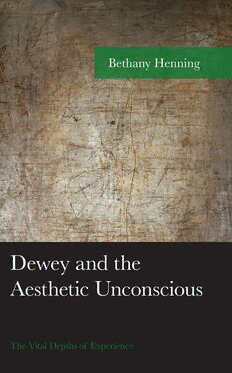
Dewey and the Aesthetic Unconscious: The Vital Depths of Experience PDF
Preview Dewey and the Aesthetic Unconscious: The Vital Depths of Experience
Dewey and the Aesthetic Unconscious AMERICAN PHILOSOPHY SERIES Series Editor John J. Kaag, University of Massachusetts Lowell Advisory Board Charlene Haddock Siegfried, Marilyn Fischer, Scott Pratt, Douglas Anderson, Erin McKenna, and Mark Johnson The American Philosophy Series at Lexington Books features cutting-edge scholarship in the burgeoning field of American philosophy. Some of the vol- umes in this series are historically oriented and seek to reframe the American canon’s primary figures: James, Peirce, Dewey, and DuBois, among others. But the intellectual history done in this series also aims to reclaim and discover figures (particularly women and minorities) who worked on the outskirts of the American philosophical tradition. Other volumes in this series address contemporary issues—cultural, political, psychological, educational—using the resources of classical American pragmatism and neo-pragmatism. Still others engage in the most current conceptual debates in philosophy, explain- ing how American philosophy can still make meaningful interventions in contemporary epistemology, metaphysics, and ethical theory. Recent Titles in the Series: Dewey and the Aesthetic Unconscious: The Vital Depths of Experience, by Bethany Henning Pragmatic Philosophy of Religion: Melioristic Case Studies, by Ulf Zackariasson Endurance Sport and the American Philosophical Tradition, by Douglas R. Hochstetler Pragmatist and American Philosophical Perspectives on Resilience, edited by Kelly A. Parker and Heather E. Keith Reconstructing the Personal Library of William James: Markings and Marginalia from the Harvard Library Collection, by Ermine L. Algaier IV Rorty, Religion, and Metaphysics, by John Owens Ontology after Philosophical Psychology: The Continuity of Consciousness in William James’s Philosophy of Mind, by Michela Bella Dewey and the Aesthetic Unconscious The Vital Depths of Experience Bethany Henning LEXINGTON BOOKS Lanham • Boulder • New York • London Published by Lexington Books An imprint of The Rowman & Littlefield Publishing Group, Inc. 4501 Forbes Boulevard, Suite 200, Lanham, Maryland 20706 www.rowman.com 86-90 Paul Street, London EC2A 4NE Copyright © 2022 by The Rowman & Littlefield Publishing Group, Inc. All rights reserved. No part of this book may be reproduced in any form or by any elec- tronic or mechanical means, including information storage and retrieval systems, without written permission from the publisher, except by a reviewer who may quote passages in a review. British Library Cataloguing in Publication Information Available Library of Congress Cataloging-in-Publication Data Names: Henning, Bethany, author. Title: Dewey and the aesthetic unconscious : the vital depths of experience / Bethany Henning. Description: Lanham : Lexington Books, [2022] | Series: American philosophy series | Includes bibliographical references and index. Identifiers: LCCN 2021060731 (print) | LCCN 2021060732 (ebook) | ISBN 9781793620217 (cloth) | ISBN 9781793620224 (ebook) Subjects: LCSH: Dewey, John, 1859–1952. | Aesthetics—Philosophy. | Experience. | Subconsciousness. Classification: LCC B945.D44 H39 2022 (print) | LCC B945.D44 (ebook) | DDC 191—dc23/eng/20220127 LC record available at https://lccn.loc.gov/2021060731 LC ebook record available at https://lccn.loc.gov/2021060732 The paper used in this publication meets the minimum requirements of American National Standard for Information Sciences—Permanence of Paper for Printed Library Materials, ANSI/NISO Z39.48-1992. For Janis, who senses the meaning and restores it; And for Michael, who sees the actual in the light of the possible. Contents Acknowledgments ix Introduction 1 Chapter 1: The Aesthetic Confrontation with Nature 13 Chapter 2: The American Unconscious 35 Chapter 3: The Feel of the Flesh, the Emergence of Mind 63 Chapter 4: Eros and the Primacy of the Aesthetic 97 Chapter 5: Uncomfortable Art and American Trauma: Reconsidering Dewey’s Unity Thesis 123 Chapter 6: From the Organic Plentitude of Being 145 Bibliography 161 Index 167 About the Author 171 vii Acknowledgments Although this book bears my name alone, I am acutely aware of its contents as series of conversations among a community of philosophers tucked into the woods of Southern Illinois. Most of us have since left that place, but the Shawnee National Forest is where I learned that we are indebted to the environments that support us. I must thank Ken Stikkers for his enthusiasm, sincerity, and his conviction that respect for the American tradition implies a critique. Doug Anderson demonstrated the extent to which philosophy can be earthy, unpretentious, and warm. I am grateful for Sara Beardsworth, who emboldened my belief that thought can recognize the poignancy of intimate life and retain its critical character. I owe a particular debt of gratitude for the continuous support of Thomas Alexander. Tom not only introduced me to the philosophy of John Dewey, he also taught me about the indivisibility of reverence and wisdom, and remains a living example of the reciprocal nature of teaching, scholarship, and the rest of the work of living. His suggestion that I think of philosophy as a “service to the gods” is a lesson that deepens and expands through time, and through practice. I would also like to thank the Society for the Advancement of American Philosophy for their hospitality and generosity, and their steadfast belief in the value of conversation and community. I am particularly indebted to Richard Polt, who read most of this manu- script in several phases of its development, and spoke with me about its contents without any visible signs of fatigue. His friendship these last three years have sustained me, and our disagreements have catalyzed new curiosi- ties and revealed as many possibilities as our accords. I am also grateful to Karl Stukenberg for his insight, and for entertaining an unfamiliar theory of the unconscious. There is no collaborator who has been as consistent and as patient as my wife, Janis, who is more sensitive to the omnipresence and the weight of aesthetic meaning than anyone I’ve known. ix
